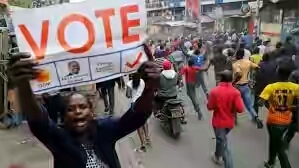
Kenyan opposition supporters skirmished with police and threw up burning barricades in pockets of the country yesterday, seeking to derail President Uhuru Kenyatta’s likely re-election with a low voter turnout.
A decade after 1,200 people were killed over another disputed election, many Kenyans feared violence could spread. As well as delayed voting, the poll is likely to trigger legal challenges to the result, stirring longer-term instability and ethnic divisions, agency reports said.
BBC quoted a Kenyan police source as saying that three people were killed in protests over the election. The source said one person was killed in the opposition stronghold of Kisumu County, another in Homa Bay in the west and the third in Athi River town outside the capital, Nairobi.
The police source spoke on condition of anonymity because they were not authorized to speak to reporters. The election commission said the majority of polls opened but voting would be delayed until Oct. 28 in four of the country’s 47 counties, all in the opposition-supporting west due to “security challenges”. The repeat election was closely watched across East Africa, which relies on Kenya as a trade and logistics hub, and in the West, which considers Nairobi a bulwark against Islamist militancy in Somalia and civil conflict in South Sudan and Burundi.
In the western city of Kisumu, police used tear gas and fired live rounds over the heads of stone-throwing youths heeding opposition leader Raila Odinga’s call for a voter boycott. Gunfire killed one protester and wounded three, a nurse said.
In Homa Bay county next door, police said they shot dead one protester and injured another. Riot police fired tear gas in Kibera and Mathare, two volatile Nairobi slums. Protesters set fires and threw stones in Kibera, and in Mathare a church was firebombed.
Around 50 people have been killed, mostly by security forces, since the original Aug. 8 vote. The Supreme Court annulled Kenyatta’s win in that poll on procedural grounds and ordered fresh elections; but Odinga pulled out of the rerun and urged a boycott because, he said, the poll would not be fair.
In the capital, polling stations saw a sprinkling of voters instead of the hours-long queues that waited in August. With Kenyatta all but ensured a victory, eyes are on the turnout, which was nearly 80 percent in the August vote.
“We are requesting them (voters) humbly that they should turn out in large numbers,” Kenyatta, the U.S.-educated son of Kenya’s founding father, Jomo Kenyatta, said after voting.
“We’re tired as a country of electioneering and I think it’s time to move forward.”
On Wednesday, the Supreme Court was due to hear a case seeking to push back the polls. But it was unable to sit after five out of the seven judges failed to show up.
“The lack of a quorum is highly unusual for a Supreme Court hearing,” a statement from the European Union said. “Not hearing this case has de facto cut off the legal path for remedy.”
In Kisumu, the scene of major ethnic violence after a disputed election in 2007, many schools designated as polling stations were padlocked. Young men milled about outside.
In Kisumu Central, constituency returning officer John Ngutai said no voting materials had been distributed and only three of 400 staff had turned up. One nervous official said his election work was a “suicide mission”. Reuters found no polling stations open.
Wafula Chebukati, head of the election commission, said counties where voting would be delayed included Homa Bay, Kisumu, Migori and Siaya. But residents were skeptical.
“Today, not a single polling station opened. People have been throwing stones all day at the police. So I don’t think people will accept that elections take place. Unless Raila says ‘OK’, it won’t happen,” said social worker Christine Onyango.
Kisumu businessman Joshua Nyamori, 42, was one of the few brave enough to defy Odinga’s stay-away call, but could not cast his ballot.
“Residents fear reprisal from political gangs organized by politicians. This is wrong,” he said.
In the coastal city of Mombasa, protesters lit tyres and timber along the main highway. Reuters contacted 18 polling stations there, and the highest voter turn-out any of them had registered at midday was 27.
“We have seen you, we know you and we have marked you,” a group of opposition supporters shouted at voters outside a polling station. Four armed police were on guard at each station – double the number on duty last time.
Yvonne Mwenesi, 21, was beaten outside another polling station before police rescued her.
“I had just voted and as I walked out, a group of men who I know attacked me saying I had betrayed them by voting,” she said, her nose bleeding.
